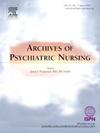研究沙特阿拉伯成年人夜食综合征的多方面因素:护理视角
IF 2.2
4区 医学
Q1 NURSING
引用次数: 0
摘要
背景夜食综合症(NES)是一种普遍存在的饮食失调症,严重影响个人的生活质量和幸福感。然而,大多数夜食综合症研究都集中在青少年群体,我们对其在成年人中的患病率和预测因素的了解还存在很大差距,尤其是在中东和北非地区。因此,本研究填补了这一空白,并确定了 NES 在沙特阿拉伯阿巴成人中的流行率及其预测因素,从而做出了新的贡献。结果13.3%的参与者表示对 NES 有全面的认识,其中 16.1%的男性和 22.5%的女性表示对 NES 有较高的认识。与此同时,14.4%的参与者为非情绪化进食者。这一发现具有重要意义,因为它揭示了沙特成年人中 NES 的高流行率。NES与高学历、睡眠模式、吸烟习惯、饮食类型和运动习惯之间存在显著差异,OR值分别为1.422、40.78、6.14、66.70和4.47,P值为<0.001。高学历、睡眠不足、吸烟、不健康饮食和缺乏锻炼是预测 NES 的最重要因素。这些发现强调了解决这些因素对预防和管理 NES 的重要性。社交媒体宣传、提高认识运动以及认知行为疗法和正念疗法可以有效解决 NES 问题。然而,有必要开展进一步的研究,以确定其根本原因并评估它们与合并症的关系,从而为今后的研究提供明确的方向。本文章由计算机程序翻译,如有差异,请以英文原文为准。
Examining the multifaceted factors of night eating syndrome among adults in Saudi Arabia: A nursing perspective
Background
Night Eating Syndrome (NES) is a prevalent eating disorder that significantly impacts individuals' quality of life and well-being. However, most NES research has focused on adolescent populations, leaving a significant gap in our understanding of its prevalence and predictors among adults, particularly in the MENA region. This study, therefore, presents a novel contribution by filling this gap and determining the prevalence of NES and its predictors among adults in Abha, Saudi Arabia.
Design
A descriptive correctional design was conducted on 714 adults randomly recruited from primary healthcare centers (PHCCs).
Methods
A self-administered questionnaire, which comprised a demographic and lifestyle data sheet and the Arabic version of the NES questionnaire, was used for data collection.
Results
13.3 % of the participants reported having full syndrome of NES, with 16.1 % of males and 22.5 % of females reporting high NES awareness. Meanwhile, 14.4 % of the participants were non-emotional eaters. This finding is significant as it sheds light on the high prevalence of NES among Saudi adults. Significant differences were observed between NES and higher education, sleeping patterns, smoking habits, dietary type, and exercise routines, with an OR of 1.422, 40.78, 6.14, 66.70, and 4.47, respectively, and a p-value of <0.001.
Conclusion
NES was a common eating disorder among Saudi adults. Higher education, inadequate sleep, smoking, unhealthy diet, and lack of exercise were the most significant predictors of NES. These findings underline the importance of addressing these factors in preventing and managing NES. Social media campaigns, awareness campaigns, and cognitive behavioral and mindfulness therapies could effectively address NES. However, further research is necessary to identify underlying causes and assess their association with comorbidities, providing a clear direction for future studies.
求助全文
通过发布文献求助,成功后即可免费获取论文全文。
去求助
来源期刊
CiteScore
3.70
自引率
0.00%
发文量
131
审稿时长
160 days
期刊介绍:
Archives of Psychiatric Nursing disseminates original, peer-reviewed research that is of interest to psychiatric and mental health care nurses. The field is considered in its broadest perspective, including theory, practice and research applications related to all ages, special populations, settings, and interdisciplinary collaborations in both the public and private sectors. Through critical study, expositions, and review of practice, Archives of Psychiatric Nursing is a medium for clinical scholarship to provide theoretical linkages among diverse areas of practice.

 求助内容:
求助内容: 应助结果提醒方式:
应助结果提醒方式:


